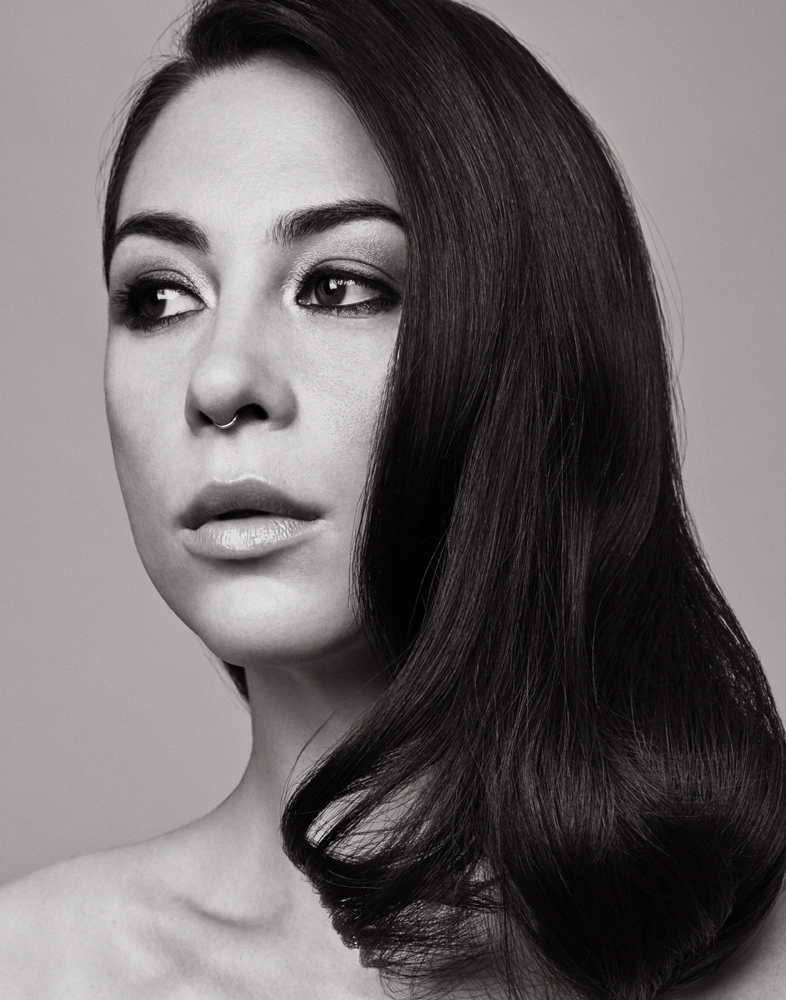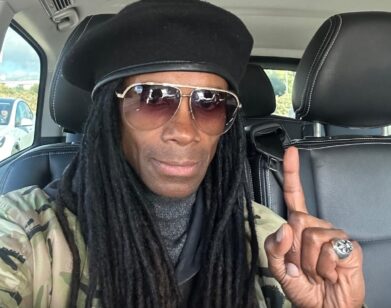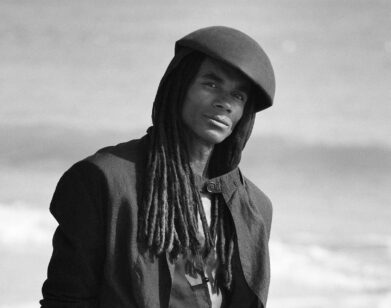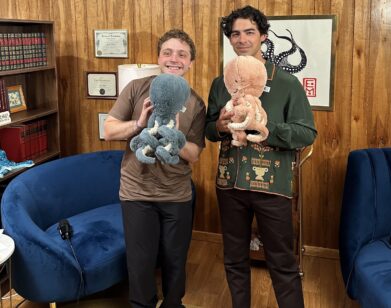Kristin Kontrol Takes Charge
KRISTIN KONTROL IN NEW YORK, APRIL 2016. PHOTOS: KINYA. STYLING: BRITT MCCAMEY/HONEY ARTISTS. HAIR: NATE ROSENKRANZ/HONEY ARTISTS USING ALTERNA HAIR CARE. MAKEUP: KOUTA FOR CHANEL LES BEIGES. PHOTO ASSISTANT: KEISUKE TSUJIMOTO. SPECIAL THANKS: SLATE STUDIOS.
For the past eight years, Kristin Gundred has been better known as Dee Dee from the indie-rock outfit Dum Dum Girls. As Dee Dee, Gundred became accustomed to performing under a persona, but as an artist, the name was something she naturally grew beyond. When writing what was originally intended to be a Dum Dum Girls album, Gundred soon realized that her musical output no longer fell into the band’s guitar-laden spectrum and Dee Dee started to feel like a static character; her art had become artifice. Unsure how to release her newly written music, Gundred worked with record label Sub Pop to find a solution, resulting in her latest moniker, Kristin Kontrol.
This Friday, Kristin Kontrol will release her debut LP, X-Communicate. As a whole, the record leaves behind the guitar melodies of the Dum Dum Girls in favor of freestyling, ’80s and ’90s dance-pop, and shimmering synths. Just before the release, we spoke with Kristin Kontrol about transitioning out of Dum Dum Girls, channeling her creativity into another project, and finding a home for her new sound.
ILANA KAPLAN: Tell me about your moniker Kristin Kontrol.
KRISTIN KONTROL: Kristin Kontrol was a super last minute and impulsive suggestion on my part. It wasn’t really an attempt to solve a problem. My label and I were at an impasse of what to do with this record I had made. Where I wanted to go musically had outgrown the Dum Dum Girls thing. Not in any slagging off of Dum Dum Girls, but I became aware that regardless of what I was putting out, it was being contextualized in the way that early Dum Dum Girls stuff was put out. Whether it was for critics or for fans, it was always like, “How does this compare to what Dum Dum Girls is supposed to sound like?” It just felt limiting and it made me feel like I couldn’t do what I wanted to do, or if I did, it would get overlooked. It wouldn’t come out without a bunch of baggage attached to it, so I said whatever and decided not to worry about that and make the music I’d been wanting to do. I’ve recently started saying that I’ve been making up for lost time, and I don’t know if that’s true, but I really went for it.
KAPLAN: So this album was all about experimentation for you?
KONTROL: This was me just opening up the whole thing, anything I wanted to experiment with. I still focus almost all of my attention on the songwriting, but in terms of the production it’s going to be free reign, basically. So I made a record that was very different. There had already been discussions about what Dum Dum Girls would be like moving forward, discussions I had been analyzing with the previous record. As the artist you’re like, “I don’t care about these things, but you’re my label so I’m willing to talk about it.”
To me, it felt like if I moved forward with this record as Dum Dum Girls, Dum Dum Girls would have to change significantly. There’s hardly any guitar on this record; it’s mostly synth-bass. It’s a whole different grouping of instruments. Assuming my current band doesn’t translate super seamlessly to these other instruments, it’s going to have to be a new band. And that seems just nuts. I was really hell-bent on the idea that if I put the idea out as Dum Dum Girls, it would be received really differently. It came down to me not willing to dismantle what we, as Dum Dum Girls, built over the past eight years. I get that the rational thing to do is just hold onto your brand for as long as possible, but I just don’t care about viability in that way. For me, I couldn’t do what I wanted to do musically like that, and I don’t want to disappoint fans, so it made sense to do something else. In 10 years, I’ve grown up.
KAPLAN: So how did you approach talking about the name change?
KONTROL: We couldn’t come up with a solution. I was like, “I think it needs to be solo. It can be Dee Dee, which will make your job easier.” They were worried about logistical issues since there have been a few “Dee Dees” throughout time. I was going back and forth, losing my footing in the creative argument where everybody is like, “We’re nervous. You should just do this as Dum Dum Girls.” For me, it was just time. I was in San Francisco and my friends had a night called Skull Kontrol. It was a super fun club night where they would play everything from The Creatures to Notorious B.I.G. It was just wild. At the time, I had started hanging out with all of these people, one of which became my husband. Somebody made a jab at me. I was starting to hang out with other people, but somebody insulted me and said, “You’re so cool, are you like Kristin Kontrol now?” I was like, “You’re an idiot, but that’s a super cool name.” It’s been my email address for several years now. When I was in Dum Dum Girls, it didn’t dawn on me that it was a super good project name. It came to me all of a sudden while I was re-telling this story. I was like, “Oh shit, is Kristin Kontrol the answer to my problems?” People who I trust said I should do it as my name, but I don’t like my full name. This name really did solve things. I emailed Sub Pop, and they thought it was perfect.
KAPLAN: What draws you to the ’80s sound in general?
KONTROL: Well, the ’80s synth sound is obvious in the first single and maybe the second. For me, it was just the knee-jerk thing, reacting against what I did for so long. I didn’t want guitars; I wanted texture and a lot of beautiful synth stuff happening. In writing, I tried to approximate stuff like handing it off to someone, like producer Kurt Feldman, and that’s his whole world. Song by song, you can pick out what’s there. There’s some more obvious stuff like the freestyle influence. Madonna was referencing from freestyle—I didn’t know about that—and later, I married into a Puerto Rican family and got the whole introduction. It was one of those beautiful moments as a music fan that you see the lineage you weren’t aware of. I was super into the ’80s and ’90s dance stuff, but I didn’t swear off guitars. There are pretty shoegazey guitars on a couple of songs. Also, Krautrock is one of my be all and end all favorite kind of music. There are definitely some tonal references there.
KAPLAN: On the record, there’s a line “Change is hard, but I really need a change of heart.” I feel like that sums up your transition. Was there a moment that made you have that change of heart to move on from Dum Dum Girls?
KONTROL: Yes and no. That line is probably the oldest line on the album. I wrote a song called “What Is Love” while I was still touring. I re-wrote it 15 times. I was probably stoned and thinking it was a clever pun or something.
On the first tour, I had a bunch of vocal issues, the record had been delayed and the album had been delayed, so when we announced the album, we waited a while between the two. The tour was wildly successful. It was 98 percent sold out. It was one of those moments where all that hard work was paying for the floors we stepped on. Then we stumbled into an ill-timed European tour and then we came back to the U.S. and that tour wasn’t wildly successful, so that was a bitter pill to swallow. I am not a baby or a diva—I’m not going to tantrum out if it’s a small show, but it was a general bummer. I thought we had made this step forward, but I worried that we were plateauing. I think this is when I subconsciously thought that we’d have to hit a ceiling with regards to how far this band could go.
Once, when we were driving back from Canada, one of us got stopped at the border and was arrested. Finally we got out and made it to the show, but it was also the anniversary of my mom’s death. It was a really loaded night and we played the best show of our lives.I was really emotional because of the day, and I think for the first time in my 15-year career as a band, I talked for a while—Dum Dum Girls really had a stoic presence. I was like, “We should probably try and break down whatever distance we built up.” That show was the first night that I felt we did that without any kind of facade blocking us. It was such an anomaly, and I wasn’t sure if I could mentally do it in Dum Dum Girls because it’s a persona.
KAPLAN: So do you feel like Kristin Kontrol is the real you?
KONTROL: Definitely. It’s not just the musical side, but it’s also this performative aspect. [Dee Dee of Dum Dum Girls] was created out of a protective layer because I was nervous. But it became preventative for me with regards to the connections I wanted to make.
KAPLAN: Should we assume that Dum Dum Girls is done?
KONTROL: I have no idea. I feel like I had lost the authority over my own music, which is an obnoxious feeling. So, establishing Kristin Kontrol was really about taking that back. That was the home for my songwriting until it didn’t really fit anymore. Now Kristin Kontrol is the home for my songwriting.
X-COMMUNICATE WILL BE RELEASED FRIDAY, MAY 27 VIA SUB POP. FOR MORE ON KIRSTIN KONTROL, VISIT HER WEBSITE.







